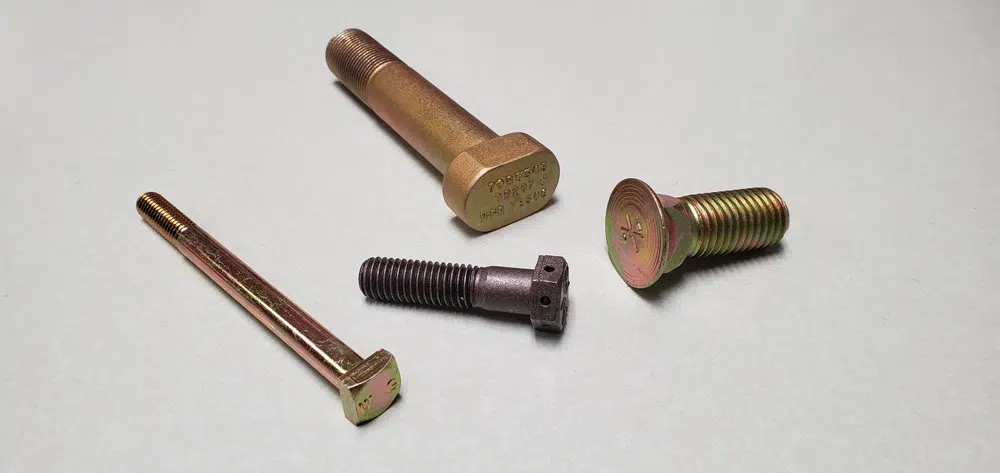There’s an abundance of fastener types out there — and when you add speciality fasteners to the mix, the list of possibilities truly becomes endless.
While your everyday hex bolt or flat head screw can accomplish many jobs, there are some situations where standard fasteners just aren’t enough to ensure all components fit and work properly together. Let’s discover a few of them by taking a look at some industries that frequently use specialty fasteners.
What Are Specialty Fasteners?
Before we look at a few different industries, let’s first define what a specialty fastener is.
In the most broad sense, specialty fasteners are fasteners designed and manufactured for a certain industry, application, or material. They’re made with unique specifications that set them apart from the common fasteners you’d find in a hardware store or use in a widely practiced application.
In many cases, these fasteners are manufactured from blueprints drawn by original equipment manufacturers (OEMs) for a specific industry and/or application, such as a fastener made for a specific vehicle model. Other times, they’re manufactured from specifications that are more general, and are used for a specific application across various industries, like fasteners used for high-pressure vessels. Further yet, they can be manufactured for a specific industry, application, and material within that application. As we said earlier, the possibilities are virtually endless.
The important thing to notice here is that the word “specialty” is pretty fluid when it comes to fasteners. You could probably even say that most fasteners are specialty fasteners — it just depends on to what extent. For our purposes here, we’re going to discuss how they relate to various industries.
RELATED:Need a specialty bolt, screw, or stud? Wilson-Garner can help.
Which Industries Use Specialty Fasteners?
There’s a simple answer to this question: a lot. From manufacturing to healthcare, retail, and beyond, specialty fasteners can be made for any industry that needs them. That said, it’s safe to say that it’d be difficult to find an industry where a specialty fastener isn’t used for at least one application.
4 Industries that Make Frequent Use of Specialty Fasteners
Although specialty fasteners can be used in any industry, there are a few that stick out for needing them more frequently. Usually, it’s the industries where products and structures are constantly being constructed. For example, at Wilson-Garner, we manufacture specialty fasteners most regularly for these four industries: automotive, military, oil and gas, and heavy machinery.
Automotive
In the automotive industry, specialty fasteners are needed in production projects for new vehicle models, as well as for service parts for existing models. Whether they be specific renditions of bolts, place bolts, studs, or screws, these specialty fasteners help to make automotive engineers’ innovative designs come to life.
The automotive industry also makes frequent use of OEM-specified fasteners for specific testing. Many automotive OEMs require standardized torque-tension, bearing surface, coefficient of friction, and torsional yield tests to ensure their vehicles are assembled properly and safe for consumers to drive. These specified, uniform fasteners are made to provide the most accurate and repeatable test results possible.
Military
Various branches of the military use specialty fasteners to build their unique, powerful, durable defense equipment. From heavy-duty vehicles to aircraft equipment, these fasteners are usually made for the US government or other military OEMs that have very specific needs for very specific, low-volume applications.
Many specialty fasteners for the military come from vehicle-specific blueprints. However, they also largely come from blueprints for specialized mil-spec, or MS, parts specifications. Similar to DIN or ISO standards, MS specifications address the size, quality, and features of various fasteners. While MS specifications were created by the military, they’re now used more generally as standards in other industries and applications as well.
Oil and Gas
The oil and gas industry has some of the most rugged terrain and conditions for structures and equipment to withstand. That’s why specialty fasteners are needed to ensure maximum effectiveness and durability — mostly in relation to withstanding high amounts of pressure and vibration in pressure vessel, rig, and refinery environments.
While specialty bolts, studs, screws, and wheel studs are all used in this industry, Place bolts are the vibration-resistant champions here. They can produce up to seven times the loosening resistance than traditional hex head cap screws — and when they’re even more specialized for their application, they become even more valuable.
Heavy Machinery
The design and production of heavy machinery is critical to a number of other industries, such as agriculture, mining, and construction. These machines need a number of specialty fasteners to operate as sturdily and durably as possible.
A huge component of specialty fasteners for heavy machinery is large diameters. In many cases, these fasteners have a diameter larger than 1” — sometimes even going as big as 2-4” or more. You’re sure to have a hard time getting your hands on parts this size if you’re not working with a specialty fastener manufacturer.
Get the Specialty Fasteners You Need at Wilson-Garner
Wilson-Garner is proud to provide a range of industries with American-made specialty fasteners. From service parts for heavy-duty trucks to innovative components for automotive testing, we can help. You send us the blueprint, we’ll deliver the solution. Contact our team to learn more.

